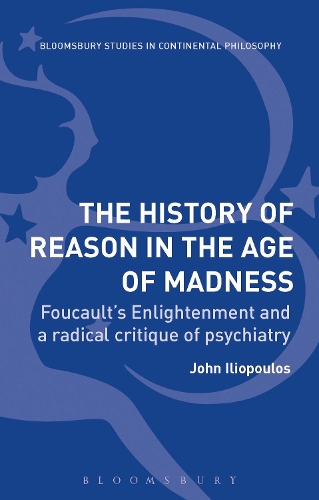
The History of Reason in the Age of Madness: Foucaults Enlightenment and a Radical Critique of Psychiatry
(Paperback)
Available Formats
Publishing Details
The History of Reason in the Age of Madness: Foucaults Enlightenment and a Radical Critique of Psychiatry
By (Author) John Iliopoulos
Bloomsbury Publishing PLC
Bloomsbury Academic
7th February 2019
United Kingdom
Classifications
Tertiary Education
Non Fiction
Psychiatry
194
Physical Properties
Paperback
224
Width 156mm, Height 234mm
322g
Description
The History of Reason in the Age of Madness revolves around three axes: the Foucauldian critical-historical method, its relationship with enlightenment critique, and the way this critique is implemented in Foucaults seminal work, History of Madness. Foucaults exploration of the origins of psychiatry applies his own theories of power, truth and reason and draws on Kants philosophy, shedding new light on the way we perceive the birth and development of psychiatric practice. Following Foucaults adoption of limit attitude, which investigates the limits of our thinking as points of disruption and renewal of established frames of reference, this book dispels the widely accepted belief that psychiatry represents the triumph of rationalism by somehow conquering madness and turning it into an object of neutral, scientific perception. It examines the birth of psychiatry in its full complexity: in the late eighteenth century, doctors were not simply rationalists but also alienists, philosophers of finitude who recognized madness as an experience at the limits of reason, introducing a discourse which conditioned the formation of psychiatry as a type of medical activity. Since that event, the same type of recognition, the same anthropological confrontation with madness has persisted beneath the calm development of psychiatric rationality, undermining the supposed linearity, absolute authority and steady progress of psychiatric positivism. Iliopoulos argues that Foucaults critique foregrounds this anthropological problematic as indispensable for psychiatry, encouraging psychiatrists to become aware of the epistemological limitations of their practice, and also to review the ethical and political issues which madness introduces into the apparent neutrality of current psychiatric discourse.
Reviews
Grounded in a deep knowledge of Foucaults oeuvre, The History of Reason in the Age of Madness establishes remarkable continuity from his early, under discussed, Introduction to Kants Anthropology to his final articles on the Enlightenment. In addition to seriously advancing our comprehension of major works such as the History of Madness John Iliopoulos clear and lucid prose sheds new light on reason, rationalism and madness as well as on anthropology and psychiatry. A highly valuable undertaking. -- Sverre Raffnse, Editor-in-chief of Foucault Studies and Professor of Philosophy, Copenhagen Business School, Denmark
The History of Reason in the Age of Madness offers a remarkably fresh and convincing interpretation of Foucaults complex and often misunderstood relation with Enlightenment philosophy and psychiatry. It successfully challenges the still prevalent view that Foucaults thinking resolutely opposes these movements, cogently arguing that such a reductive view would contradict one of the basic aims of Foucaults writings which is to expose the ambiguity of all phenomena, their susceptibility to ongoing critique, modification and radical transformation. This important work is a must for scholars of Foucault, critical psychiatry and Enlightenment studies. -- Kevin Inston, Senior Lecturer, Centre for Multidisciplinary and Intercultural Inquiry, University College London, UK
Author Bio
John Iliopoulos is a Consultant Psychiatrist and Researcher at the Centre for Philosophy and Psychiatry, University of Athens, Greece.
